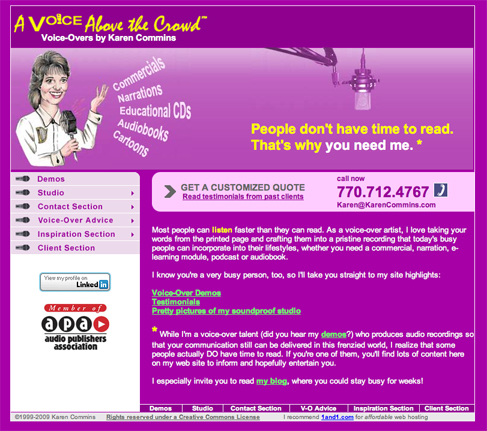Bonjour! You may think the movie Julie and Julia is only about Julia Child, Julie Powell, Paris, and cooking. While those are reasons enough to watch this excellent and highly enjoyable movie, you may be surprised to learn that the movie also contains 5 lessons that will benefit voiceover artists:
1) Neither Julia Child nor Julie Powell became cooks and writers simply to make money. Both answered an inner calling and pursued their passions. Both women also had additional income to support them when they started their endeavors.
Many people enter the voice-over industry under the mistaken belief that it is an easy way to make money. They view voice-over like a part-time job at a fast food restaurant, where they have no start-up or ongoing costs and need no particular skills in order to make money. Anyone could come in off the street, fill out an application, and begin work.
As I’ve written numerous times, voice-over is a business. I wouldn’t say it follows the 80/20 rule; it’s more like the 95/5 rule — 95% of your time is spent in activities to develop and enhance your delivery and interpretation skills, market your services, and build client relationships that will enable you to obtain the 5% of the jobs where you actually work as a voice talent.
2) Julie didn’t give up her day job. I know this item seems like take two of the same script. However, I added this tip to remind you that there’s no shame in having a day job. It can actually enable you to pursue your voiceover dreams.
3) When Julie compared herself to her friends, she felt small, insignificant, and depressed. I know of no quicker way to feel bad than to start comparing myself to other people. The cure for these spiraling negative thoughts is to take charge of your thoughts and words, which should inspire you to take positive action.
4) Both women created their own work. Did Julia Child wait for a restaurant manager to hire her to cook? Did Julie Powell wait for a magazine or book editor to hire her to write? Figure out the kinds of projects that you enjoy voicing and create them yourself. You can create your own commercials, movie trailers, audiobooks, or whatever you desire.
Whether you show the finished product to anyone or make any money from it is irrelevant. The point is to feed your passion and exercise your creativity on a regular basis. The more you do what you want to do and enjoy it, the more you become the person you want to be. Also, I’ve had a couple of occasions where I created something for my own enjoyment and skill practice. I loved the process and ended up using the finished piece as a demo from which I landed new clients.
5) Julie and Julie exemplify Thoreau’s famous quote. Henry David Thoreau wrote this gem, which is as true now as it was in his time:
If one advances confidently in the direction of his dreams
and endeavors to live the life he has imagined,
he will meet with success unexpected in common hours.
To me, it means that the energy you put out in the world will come back to you in ways you didn’t imagine — and be better than you could ever dream possible!
May all your voiceover endeavors bring you joie de vivre!


 Karen Commins’ voiceover web site version 2 (circa 2005-2009) – snapshot from 10/18/2009
Karen Commins’ voiceover web site version 2 (circa 2005-2009) – snapshot from 10/18/2009 Front door at Creative Sound Concepts, Atlanta — “Sound starts here and goes everywhere”
Front door at Creative Sound Concepts, Atlanta — “Sound starts here and goes everywhere” Karen Commins’ current voiceover web site — version 3 now on-line as of 10/18/2009
Karen Commins’ current voiceover web site — version 3 now on-line as of 10/18/2009